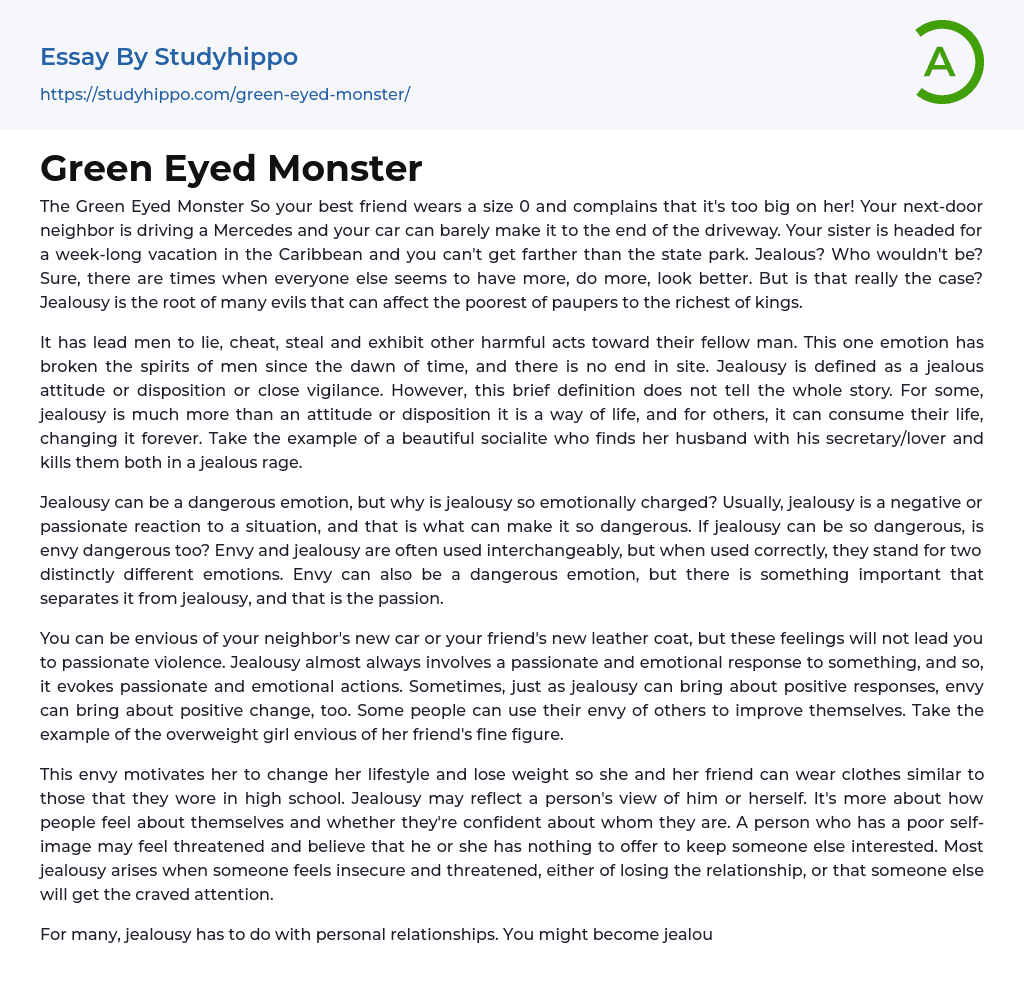Jealousy, also known as the Green Eyed Monster, is a common emotion that individuals experience. It can be triggered by various situations, such as witnessing a friend who wears a size 0 and complains about it being too big or observing your neighbor driving a luxurious Mercedes while you struggle with your own car. Even seeing your sister going on an extravagant vacation while you can only afford to visit the state park can evoke feelings of jealousy. It is natural and understandable to feel this way in these circumstances. However, it is important to question whether things are truly what they seem at first glance. Jealousy does not discriminate; it has the potential to affect anyone, regardless of their financial status – whether they are the poorest paupers or the wealthiest kings.
The emotion of jealousy has plagued humanity for centuri
...es, driving individuals to engage in deceitful and harmful behaviors towards others. This all-encompassing feeling has shattered the spirits of many throughout history and continues to persist. Though jealousy can be described as a jealous attitude or disposition, this definition fails to capture its true essence. For some, jealousy is not just a mindset or trait; it becomes a way of life, consuming their entire existence and permanently altering it. To illustrate this point, consider the story of an attractive socialite who discovers her spouse with his secretary/lover and proceeds to violently murder them both out of intense envy.
Jealousy is a perilous emotion, but its emotional intensity makes it so. Jealousy is typically a negative or intense response to a situation, amplifying its potential danger. Envy, frequently used synonymously with jealousy, actually
represents a separate emotion. Envy can also be hazardous, but there is a crucial distinction that sets it apart from jealousy: passion.
Although envy and jealousy can both result in intense emotional reactions, they differ in their causes. While jealousy often arises from a passionate response to a situation, envy stems from coveting what someone else possesses. Despite this distinction, both envy and jealousy can spur positive outcomes. For instance, envy can motivate individuals to enhance themselves, as illustrated by an overweight girl who aspires to attain her friend's slim physique.
The text explores the role of envy as a driving force for individuals to transform their lifestyle and achieve weight loss. The desire stems from wanting to don clothes reminiscent of their high school days, mirroring a friend's style. Additionally, the text suggests that jealousy can manifest as an indication of one's self-perception and confidence level. People with low self-esteem may perceive threats and feel inadequate in maintaining others' interest. Insecure feelings often give rise to jealousy, stemming from fear of losing relationships or not receiving desired attention.
Feelings of neglect or uneasiness often lead to jealousy in personal relationships. Trust and mutual respect are crucial for healthy communication and a thriving relationship. Although initially flattering, jealousy can also indicate emotional instability when a partner constantly seeks attention.
Excessive admiration for one's focus can result in a consistent lack of faith and doubt. When a spouse harbors envy towards their wife's innocent relationships with other women and attempts to control her by isolating her from friends, it can create significant issues. Jealousy extends beyond romantic connections and may arise from others' successes or social
networks. This is also connected to self-esteem, as individuals who lack a strong sense of self often believe they are not receiving what they deserve and perceive others as always having advantages.
The purpose of jealousy is important to comprehend and acknowledge, as it serves as a signal of our inner selves. When we feel ashamed of our jealousy, we tend to conceal it and exhibit protective emotions like anger, frustration, or resentment. Rather than hiding our emotions, we should reflect on why we are experiencing jealousy. Although fairness may not be present in all situations, it is unethical to be deceitful about our feelings. There will always be individuals who possess greater attractiveness, talent, or success. Nonetheless, does it really hold significance?
- Pressure essays
- Confidence essays
- Disgrace essays
- Lost essays
- Harmony essays
- Fairness essays
- Sarcasm essays
- Respect essays
- Responsibility essays
- Empathy essays
- Suffering essays
- Suspense essays
- Fear essays
- Feeling essays
- Loneliness essays
- Ambition essays
- Tolerance essays
- Hope essays
- Inspiration essays
- Kindness essays
- Shame essays
- Desire essays
- Doubt essays
- Grief essays
- Hate essays
- Laughter essays
- Passion essays
- Pride essays
- Forgiveness essays
- Happiness essays
- Humanity essays
- Loyalty essays
- Guilt essays
- Honesty essays
- Betrayal essays
- Need essays
- Boredom essays
- Courage essays
- Regret essays
- Anger essays
- Honor essays
- Honesty Is The Best Policy essays
- John Locke essays
- 9/11 essays
- A Good Teacher essays
- A Healthy Diet essays
- A Modest Proposal essays
- A&P essays
- Academic Achievement essays
- Achievement essays




